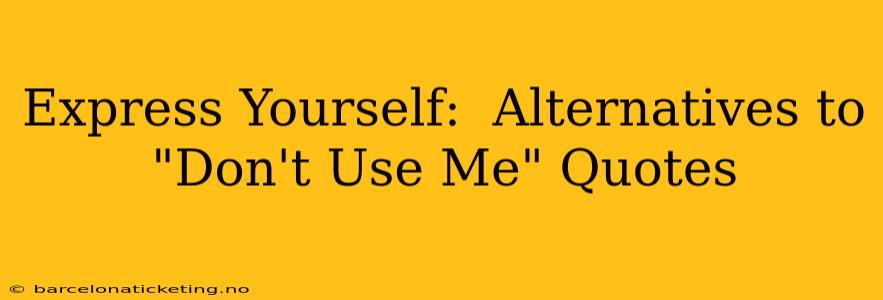The phrase "Don't use me" is often deployed in situations where a person feels exploited, disregarded, or simply used as a means to an end. However, it can feel blunt, overly passive, or even somewhat childish. This article explores more nuanced and powerful alternatives, depending on the specific context and the desired outcome. We'll delve into various scenarios and provide alternative phrasing to effectively communicate your boundaries and feelings.
Why "Don't Use Me" Might Not Be the Best Choice
While straightforward, "Don't use me" lacks the sophistication and emotional depth to fully convey the gravity of the situation. It doesn't articulate the why behind your feelings, leaving the other person potentially confused or unmoved. It can also come across as accusatory without providing constructive feedback or a path forward.
What Are Better Ways to Express Your Feelings?
The best alternative depends heavily on the context. Let's explore some scenarios and appropriate responses:
Scenario 1: Feeling Exploited in a Workplace Setting
Instead of: "Don't use me."
Try:
- "I'm feeling overwhelmed with my current workload. Can we discuss prioritizing tasks to ensure everything gets done effectively and fairly?" (Focuses on solutions)
- "I'm concerned that my skills and time are being misallocated. Let's review my responsibilities to ensure they align with my role and capabilities." (Professional and assertive)
- "I value my contribution to this team, but I'm reaching my capacity. To maintain my productivity and prevent burnout, I need to reassess my workload." (Emphasizes self-preservation)
Scenario 2: Feeling Used in a Friendship or Relationship
Instead of: "Don't use me."
Try:
- "I've noticed a pattern where I'm always the one giving, and I'm feeling a bit drained. I need more reciprocity in this relationship." (Highlights imbalance)
- "I value our friendship/relationship, but lately, I feel like my needs are being overlooked. Can we talk about how we can better support each other?" (Opens a dialogue)
- "I care about you, but I can't continue to be the only one putting in effort. I need to prioritize my own well-being." (Clearly sets a boundary)
Scenario 3: Feeling Manipulated or Taken Advantage Of
Instead of: "Don't use me."
Try:
- "I feel manipulated when you... [explain the specific behavior]. This isn't how I want our interactions to be." (Addresses the specific behavior)
- "I'm uncomfortable with the way you're approaching this situation. I need to be treated with respect." (Sets a clear boundary)
- "I'm recognizing a pattern of behavior that leaves me feeling exploited. This isn't sustainable for me." (Identifies the pattern and its impact)
Scenario 4: Being Used for Information or Resources
Instead of: "Don't use me."
Try:
- "I'm happy to help, but I need to understand how this request aligns with my responsibilities/goals." (Seeks clarification and justification)
- "I'm comfortable sharing information within reasonable limits. Let's clarify what you need and how I can assist without compromising [confidentiality/personal information]." (Sets clear limitations)
- "While I'm willing to share my expertise, I'm not comfortable providing unlimited support without proper compensation/recognition." (Establishes value and expectations)
Choosing the Right Words: Focus on "I" Statements
The key to effective communication is using "I" statements. These focus on your feelings and experiences rather than placing blame on the other person. This approach opens the door for productive conversations and helps the other person understand your perspective without feeling attacked.
Remember Your Self-Worth
Ultimately, the best alternative to "Don't use me" is a statement that reflects your self-worth and asserts your boundaries. Choose your words carefully, considering the context and your desired outcome. Prioritize clear, assertive communication that prioritizes your well-being and respects your needs.

